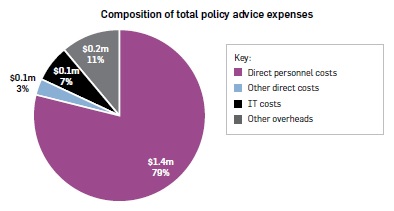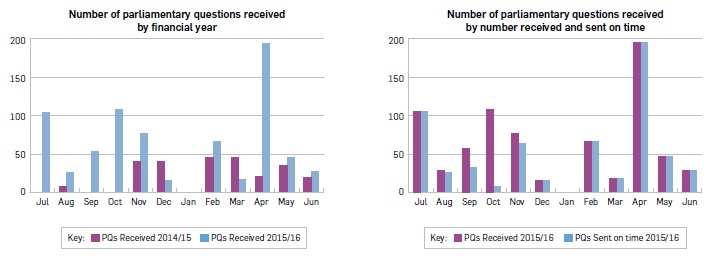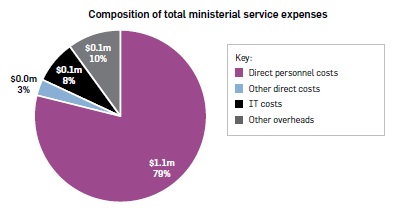Appropriation - Policy Advice and Ministerial Services (Multi-Category Output Appropriation)
APPROPRIATION: POLICY ADVICE
This output class is limited to the provision of advice (including second opinion advice and contributions to policy advice led by other agencies) to support decision-making by Ministers on government policy matters.
WHAT CORRECTIONS DOES
Corrections provides advice (including second opinion advice and contributions to policy advice led by other agencies) to support decision-making by Ministers on government policy matters.
OPERATING CONTEXT
Policy advice was provided across a number of issues including:
- Sentencing (Electronic Monitoring of Offenders) Legislation Bill as it moved through Select Committee stages
- Drug and Alcohol Testing of Community-based Offenders and Bailees Legislation Bill, through Select Committee stages
- Advice on potential amendments to governing legislation, including the Corrections Act 2004 and associated regulation
- Working with NZ Police to support the Child Protection (Child Sex Offender Register Bill) through Select Committee stages
- Ensuring that offenders deported from other countries are managed appropriately
- Development of Breaking the cycle: Our drug and alcohol strategy through to 2020
- Collaborative work to improve identity management in the Justice Sector.
HOW CORRECTIONS PERFORMED
| 2013 | 2014 | 2015 | 2016 | 2016 | 2017 | |
|---|---|---|---|---|---|---|
| Assessment of performance | Actual standard | Actual standard | Actual standard | Actual standard | Budget standard | Budget standard |
| POLICY ADVICE AND MINISTERIAL SERVICES | ||||||
| The office of the Minister of Corrections is satisfied with the level of quality of policy advice, and of draft Ministerial correspondence, provided by the Department (determined by an Annual Survey of Satisfaction) | - | New for 2015 | 91% | 94% | 84% | 84% |
| QUALITY | ||||||
| Technical quality of policy advice papers assessed by a survey with methodological robustness of 90%11 | New for 2014 | 75% | 75% | 72% | At least an average of 70% | At least an average of 70% |
| The office of the Minister of Corrections is satisfied with the quality of policy advice provided, including quality of the written material and quality of the advice provided (measure through an annual survey)12 | New for 2014 | 100% | 83% | 82% | 78% | 78% |
| COST | ||||||
| The total cost per output hours of professional staff time devoted to policy advice and other policy functions13 | New for 2014 | $98 | $92 | $98 | $105 | $105 |
Corrections met all the performance standards for this output, with the quality of advice and Ministerial satisfaction above the performance standard.
HOW MUCH DID IT COST?
For the year ended 30 June 2016
| 2015 | 2016 | 2016 | 2016 | 2017 | |
|---|---|---|---|---|---|
| Actual $000 | Actual $000 | Budget (unaudited) $000 | Supp. estimates (unaudited) $000 | Forecast* (unaudited) $000 | |
| REVENUE | |||||
| Crown | 3,836 | 1,644 | 3,331 | 1,644 | 1,646 |
| Departmental | - | - | - | - | - |
| Other | - | - | - | - | - |
| Total revenue | 3,836 | 1,644 | 3,331 | 1,644 | 1,646 |
| Total expenses | 3,332 | 1,785 | 3,331 | 1,644 | 1,646 |
| Net (deficit) / surplus | 504 | (141) | - | - | - |
* Forecast financial statements have been prepared using Budget Economic Fiscal Update (BEFU) 2016.
The total expense for this appropriation was $1.8 million. Expenses within this output class are primarily staff related costs incurred in providing policy advice.
Refer to the chart below for the composition of total expenditure by major expense category.

Actual expenditure was $1.5 million lower than 2015 actuals, mainly due to a change in cost allocation methodology relating to research expenditure. In 2015 all research expenditure was allocated to this output class, while allocations for this year reflect the contribution of such expenditure to multiple output classes (e.g. research on rehabilitation activity is now recognised in the Rehabilitation and Reintegration output class if not directly linked to a current policy).
APPROPRIATION - MINISTERIAL SERVICES
This output is limited to the provision of responses to ministerial correspondence and parliamentary questions.
WHAT CORRECTIONS DOES
Corrections provide responses to ministerial correspondence and parliamentary questions.
OPERATING CONTEXT
Corrections ensures that timely, accurate and relevant responses are provided to ministerial correspondence, parliamentary questions, and requests for information made under the Official Information Act.
HOW CORRECTIONS PERFORMED
| 2013 | 2014 | 2015 | 2016 | 2016 | 2017 | |
|---|---|---|---|---|---|---|
| Assessment of performance | Actual standard | Actual standard | Actual standard | Actual standard | Budget standard | Budget standard |
| QUALITY | ||||||
| The percentage of ministerial draft correspondence that is signed off without changes | 96% | 96% | 98% | 97% | 90% | 95% |
| TIMELINESS | ||||||
| The percentage of all responses to parliamentary questions that are completed within five working days | 100% | 99% | 98% | 81% | 98% | 98% |
| The percentage of responses to ministerial draft correspondence that are completed within 20 working days | 100% | 100% | 100% | 100% | 98% | 98% |
From September to November, Corrections traditionally receives a low volume of parliamentary questions (PQs) and our resource capacity model reflects these historical volumes. Due to an unexpected increase in both the number and complexity of questions, Corrections were unable to deliver 100% of the parliamentary questions during this period. Corrections have since increased resource capacity and from December to year end Corrections answered 100% of parliamentary questions within five working days.
Refer to the charts below for the comparison of the number of parliamentary questions received this financial year compared to last financial year and the number of parliamentary questions answered this year compared to the number received.

HOW MUCH DID IT COST
For the year ended 30 June 2016
| 2015 | 2016 | 2016 | 2016 | 2017 | |
|---|---|---|---|---|---|
| Actual $000 | Actual $000 | Budget (unaudited) $000 | Supp. estimates (unaudited) $000 | Forecast* (unaudited) $000 | |
| REVENUE | |||||
| Crown | 976 | 1,640 | 1,040 | 1,640 | 1,041 |
| Departmental | - | - | - | - | - |
| Other | - | - | - | - | - |
| Total revenue | 976 | 1,640 | 1,040 | 1,640 | 1,041 |
| Total expenses | 1,008 | 1,341 | 1,040 | 1,640 | 1,041 |
| Net surplus / (deficit) | (32) | 299 | - | - | - |
* Forecast financial statements have been prepared using Budget Economic Fiscal Update (BEFU) 2016.
The total expense for this appropriation was $1.3 million. Expenses within this output class are primarily staff related costs incurred in providing responses to ministerial and parliamentary questions.
Refer to the chart below for the composition of total expenditure by major expense category.

11 This indicator provides a standardised score for the policy technical quality reviews undertaken by the third party assessor, in this case the New Zealand Institute of Economic Research.
12 This indicator is a quantitative representation of the Minister of Corrections’ satisfaction with the policy advice provided by Corrections against the following standards:
- completeness/alignment
- timeliness
- robustness
- value for money
- likelihood to recommend
- overall satisfaction and possible improvements in the delivery of policy advice.
13 This indicator provides the total costs of an hour of professional staff time devoted to both policy advice and other policy unit outputs. Total cost includes labour, overhead, support staff, direct costs and outsourced work to support output production.

